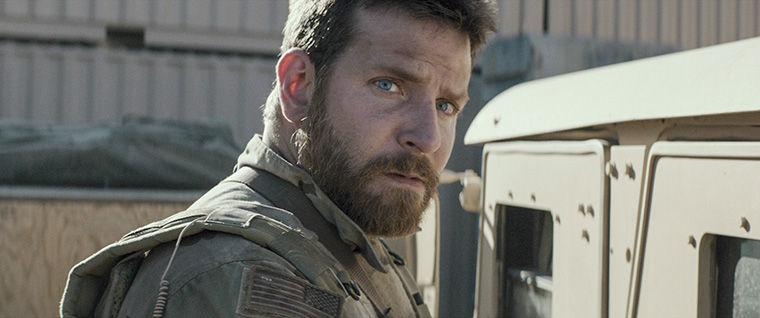High-minded ‘American Sniper’ portrays war as a video game
Clint Eastwood’s controversial new film “American Sniper” stars Bradly Cooper as sharpshooting Navy SEAL sniper Chris Kyle. The film has been nominated for a total of six 2015 Academy Awards, including “Best Picture,” “Best Original Screenplay” and “Best Actor,” Cooper’s third nomination.
January 26, 2015
In an early scene, the protagonist’s father talks about sheep, wolves and sheepdogs, setting up the metaphor for Chris Kyle’s character. The audience may view him as a sheep, blindly following orders in an unjust war, or as a wolf, fulfilling a crusade. The audience might even view him as a sheepdog—a hero.
Clint Eastwood’s latest film, six-time Oscar-nominated “American Sniper,” follows the life of real soldier Chris Kyle (Bradley Cooper) and his rise as one of the deadliest snipers in the Iraq War. Based on Kyle’s autobiography of the same name, the controversial movie delves into the complex matter of war, and it is a difficult film to digest. Is Eastwood a jingoist promoting American imperialism or a liberal questioning our military? There is room for more than one interpretation, and it really depends on the viewer’s personal beliefs.
Despite the complexity surrounding the film, “American Sniper” is simplistic and not without fault. The film feels like a typical Eastwood film with its themes of masculinity and American heroism, but it ends up as just another war film instead of a complex film.
Part of this stems from the utter lack of perspective on the lives of the men, women and children that Kyle kills. Instead of looking through the scope of a real American sniper, it is delivered from the perspective of a Call of Duty player, as the large battle scenes feel more Rambo–esque than artistic. Each kill may leave a mark on Cooper’s character, but the audience is never given the time or vantage point to register the event’s impact. Even in a scene where an Iraqi man shares his food with the Americans, the camera focuses only on the soldiers. If the Iraqis and Americans had any substantial interactions, the audience is not privy to them. The filmmakers make it clear Kyle and his comrades view the Iraqis as savages even without the addition of Kyle’s thoughts on the subject, but the consequence of showing this from an American perspective is that a viewer will wonder if the filmmakers agree with Kyle.
For a war film, the movie spends a while getting the audience there, but does not take time to show how Kyle became the man he is by the start of the war. Instead, it gives an unnecessary history lesson in the events leading up to the Iraq War. Despite possible thematic failings, the film’s strength lies on the battlefield, so it was unfortunate Eastwood delayed introducing.
Despite the themes, the war scenes are intense. The film hosts a brilliant score—it remains mostly unheard until exactly the right moments, doubling its effect. The special effects and research pay off, as the war looks and sounds authentic. The chaotic camera-work is well-edited to create battles that are as haunting as they are extreme. Once the war begins, the scenes back home feel more intentional and leave more of an impact, especially considering Sienna Miller’s terrific performance as Kyle’s wife, Taya. There is a clear decline in Kyle’s mental health, and the effects of war are portrayed well.
Eastwood clearly attempts complexity. The script presents subtle lapses in faith among the people in Kyle’s life, whether it be faith in war, God or himself. It is no coincidence the climax takes place during a visually nil sandstorm.
The real powerhouse is Cooper’s performance. After easily selling the audience on the patriotic Texan cowboy that Kyle is, Cooper slowly adds the pain of war onto his face little by little, masking it behind a stoic, borderline psychotic smile. It is a slow burn, but the payoff is big. Cooper begins to question his belief system while desperately holding onto it desperately. Even after he leaves the war and his life returns to normal, he remains changed, forever leaving the audience uneasy. Whether or not Kyle believed in what he was doing, Cooper’s performance at least allows the audience to doubt—whether or not they do so is up to them.








